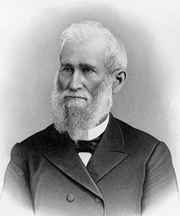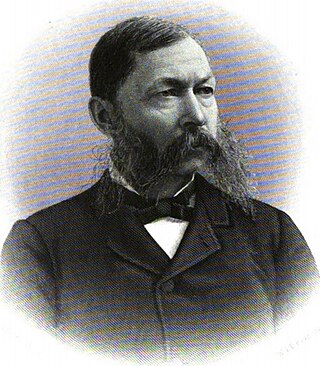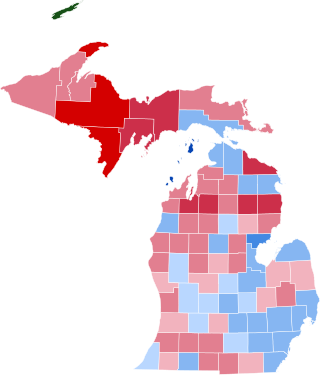
Presidential elections were held in the United States on November 4, 1884. Democratic Governor Grover Cleveland of New York narrowly defeated Republican James G. Blaine of Maine. It was set apart by mudslinging and personal allegations that eclipsed substantive issues, such as civil administration change. Cleveland was the first Democrat elected president of the United States since James Buchanan in 1856, the first to hold office since Andrew Johnson left the White House in 1869, and the last to hold office until Woodrow Wilson, who began his first term in 1913. For this reason, 1884 is a significant election in U.S. political history, marking an interruption in the era when Republicans largely controlled the presidency between Reconstruction and the Great Depression.

Presidential elections were held in the United States on November 6, 1888. Republican nominee Benjamin Harrison, a former U.S. senator from Indiana, defeated incumbent Democratic President Grover Cleveland of New York. It was the third of five U.S. presidential elections in which the winner did not win the national popular vote, which would not occur again until the 2000 US presidential election. Cleveland was the last incumbent Democratic president to lose reelection until Jimmy Carter in 1980.

Russell Alexander Alger was an American politician and businessman. He served as the 20th governor of Michigan, U.S. Senator, and U.S. Secretary of War. Alger's life was a "rags-to-riches" success tale. He became an army officer, financier, lumber baron, railroad owner, and government official in several high offices. He was supposedly a distant relation of author Horatio Alger.

Josiah Williams Begole was an American politician serving as a U.S. Representative from 1873 to 1875 and the 19th governor of Michigan from 1883 to 1885.

Moses Wheelock Field was a businessman and politician. He served as a member of the United States House of Representatives from the U.S. state of Michigan, and was instrumental in organizing the Independent Greenback Party.

The 1888 Republican National Convention was a presidential nominating convention held at the Auditorium Building in Chicago, Illinois, on June 19–25, 1888. It resulted in the nomination of former Senator Benjamin Harrison of Indiana for president and Levi P. Morton of New York, a former Representative and Minister to France, for vice president. During the convention, Frederick Douglass was invited to speak and became the first African-American to have his name put forward for a presidential nomination in a major party's roll call vote; he received one vote from Kentucky on the fourth ballot.

The 1884 United States presidential election in Michigan took place on November 4, 1884, as part of the 1884 United States presidential election. Voters chose 13 representatives, or electors, to the Electoral College, who voted for president and vice president.

The 1882 Massachusetts gubernatorial election was held on November 7.

The 1952 Michigan gubernatorial election was held on November 4, 1952. Incumbent Democrat G. Mennen Williams defeated Republican nominee Frederick M. Alger Jr. with 49.96% of the vote.

The 1876 Michigan gubernatorial election was held on November 7, 1876. Republican nominee Charles Croswell defeated Democratic nominee William L. Webber with 52.39% of the vote.

The 1878 Michigan gubernatorial election was held on November 5, 1878. Incumbent Republican Charles Croswell defeated Democratic nominee Orlando M. Barnes with 44.66% of the vote.

The 1880 Michigan gubernatorial election was held on November 2, 1880. Republican nominee David Jerome defeated Democratic nominee Frederick M. Holloway with 51.25% of the vote.

The 1882 Michigan gubernatorial election was held on November 7, 1882. Josiah W. Begole ran on a fusion ticket, representing both the Democratic and Greenback ticket. He defeated incumbent Republican David Jerome with 49.42% of the vote.

The 1886 Michigan gubernatorial election was held on November 2, 1886. Republican nominee Cyrus G. Luce defeated Fusion candidate George L. Yaple with 47.65% of the vote.

The 1888 Michigan gubernatorial election was held on November 6, 1888. Republican nominee Cyrus G. Luce defeated Fusion candidate Wellington R. Burt with 49.20% of the vote.

The 1892 Michigan gubernatorial election was held on November 1, 1892. Republican nominee John T. Rich defeated Democratic candidate Allen B. Morse with 47.21% of the vote.

The 1883 Massachusetts gubernatorial election was held on November 6.

The 1886 Massachusetts gubernatorial election was held on November 2, 1886. Incumbent Republican governor George D. Robinson did not run for re-election to a fourth term in office. He was succeeded by his lieutenant governor Oliver Ames, who defeated Democratic former state senator John F. Andrew.

The 1884 Massachusetts gubernatorial election was held on November 4. Incumbent Republican governor George D. Robinson was re-elected to a second term in office over Democrat William Crowninshield Endicott.

The 1884 Illinois gubernatorial election was held on November 4, 1884.























